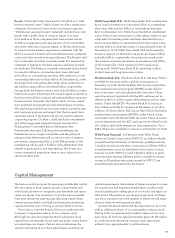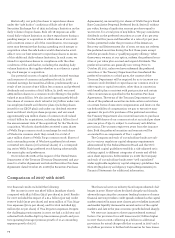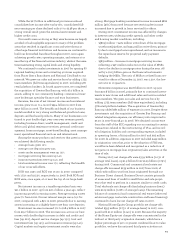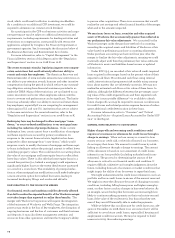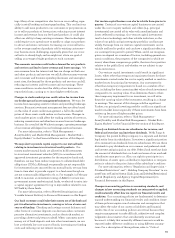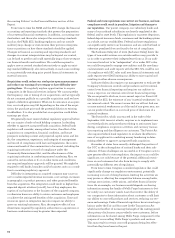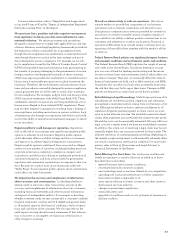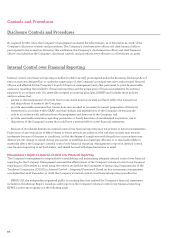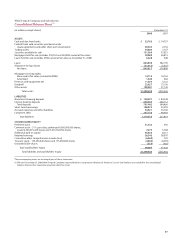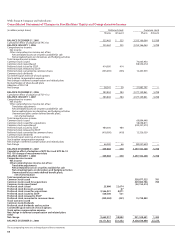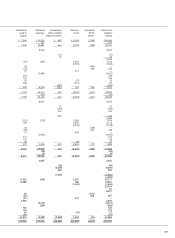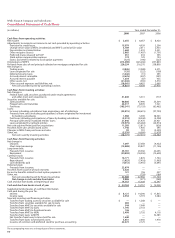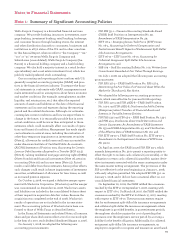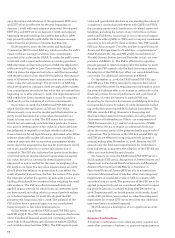Wells Fargo 2008 Annual Report Download - page 85
Download and view the complete annual report
Please find page 85 of the 2008 Wells Fargo annual report below. You can navigate through the pages in the report by either clicking on the pages listed below, or by using the keyword search tool below to find specific information within the annual report.For more information, refer to “Regulation and Supervision”
in our 2008 Form 10-K and to “Report of Independent Registered
Public Accounting Firm” in this Report.
We may incur fines, penalties and other negative consequences
from regulatory violations, possibly even inadvertent or unin-
tentional violations. We maintain systems and procedures
designed to ensure that we comply with applicable laws and reg-
ulations. However, some legal/regulatory frameworks provide for
the imposition of fines or penalties for noncompliance even
though the noncompliance was inadvertent or unintentional and
even though there was in place at the time systems and proce-
dures designed to ensure compliance. For example, we are sub-
ject to regulations issued by the Office of Foreign Assets Control
(OFAC) that prohibit financial institutions from participating in
the transfer of property belonging to the governments of certain
foreign countries and designated nationals of those countries.
OFAC may impose penalties for inadvertent or unintentional vio-
lations even if reasonable processes are in place to prevent the
violations. Therefore, the establishment and maintenance of sys-
tems and procedures reasonably designed to ensure compliance
cannot guarantee that we will be able to avoid a fine or penalty
for noncompliance. For example, in April 2003 and January 2005
OFAC reported settlements with Wells Fargo Bank, N.A. These
settlements related to transactions involving inadvertent acts or
human error alleged to have violated OFAC regulations. There
may be other negative consequences resulting from a finding of
noncompliance, including restrictions on certain activities. Such
a finding may also damage our reputation (see below) and could
restrict the ability of institutional investment managers to invest
in our securities.
Negative publicity could damage our reputation. Reputation
risk, or the risk to our earnings and capital from negative public
opinion, is inherent in our business. Negative public opinion
could adversely affect our ability to keep and attract customers
and expose us to adverse legal and regulatory consequences.
Negative public opinion could result from our actual or alleged
conduct in any number of activities, including lending practices,
corporate governance, regulatory compliance, mergers and
acquisitions, and disclosure, sharing or inadequate protection of
customer information, and from actions taken by government
regulators and community organizations in response to that con-
duct. Because we conduct most of our businesses under the
“Wells Fargo” brand, negative public opinion about one business
could affect our other businesses.
We depend on the accuracy and completeness of information
about customers and counterparties. In deciding whether to
extend credit or enter into other transactions, we rely on the
accuracy and completeness of information about our customers,
including financial statements and other financial information
and reports of independent auditors. For example, in deciding
whether to extend credit, we may assume that a customer’s audited
financial statements conform with U.S. GAAP and present fairly,
in all material respects, the financial condition, results of opera-
tions and cash flows of the customer. We also may rely on the
audit report covering those financial statements. If that informa-
tion is incorrect or incomplete, we may incur credit losses or
other charges to earnings.
We rely on others to help us with our operations. We rely on
outside vendors to provide key components of our business
operations such as internet connections and network access.
Disruptions in communication services provided by a vendor or
any failure of a vendor to handle current or higher volumes of
use could hurt our ability to deliver products and services to our
customers and otherwise to conduct our business. Financial or
operational difficulties of an outside vendor could also hurt our
operations if those difficulties interfere with the vendor’s ability
to serve us.
Federal Reserve Board policies can significantly impact business
and economic conditions and our financial results and condition.
The Federal Reserve Board (FRB) regulates the supply of money
and credit in the United States. Its policies determine in large
part our cost of funds for lending and investing and the return
we earn on those loans and investments, both of which affect our
net interest margin. They also can materially affect the value of
financial instruments we hold, such as debt securities and MSRs.
Its policies also can affect our borrowers, potentially increasing
the risk that they may fail to repay their loans. Changes in FRB
policies are beyond our control and can be hard to predict.
Risks Relating to Legal Proceedings Wells Fargo and some of its
subsidiaries are involved in judicial, regulatory and arbitration
proceedings concerning matters arising from our business activi-
ties. Although we believe we have a meritorious defense in all
significant litigation pending against us, there can be no assur-
ance as to the ultimate outcome. We establish reserves for legal
claims when payments associated with the claims become proba-
ble and the costs can be reasonably estimated. We may still incur
legal costs for a matter even if we have not established a reserve.
In addition, the actual cost of resolving a legal claim may be sub-
stantially higher than any amounts reserved for that matter. The
ultimate resolution of a pending legal proceeding, depending on
the remedy sought and granted, could materially adversely affect
our results of operations and financial condition. For more infor-
mation, refer to Note 15 (Guarantees and Legal Actions) to
Financial Statements in this Report.
Risks Affecting Our Stock Price Our stock price can fluctuate
widely in response to a variety of factors, in addition to those
described above, including:
• general business and economic conditions;
• recommendations by securities analysts;
• new technology used, or services offered, by our competitors;
• operating and stock price performance of other companies
that investors deem comparable to us;
• news reports relating to trends, concerns and other issues in
the financial services industry;
• changes in government regulations;
• natural disasters; and
• geopolitical conditions such as acts or threats of terrorism or
military conflicts.


